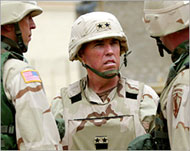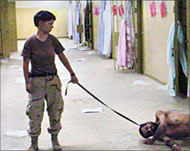Karpinski: Ghraib was out of my control
The US general formerly in charge of Iraqi prisons has said she resisted handing control of the facility to contracted “military intelligence” officals but was overruled by superiors.

A detailed account given to Army investigators by Brigadier General Janis Karpinski on Wednesday names two other officers who appear to have been at the heart of command decisions.
She claims Lieutenant General Ricardo Sanchez, commander of ground forces in Iraq, and the new US prison chief, Major General Geoffrey Miller, are ultimately responsible for what happened at Abu Ghraib – including the decision to permit lethal force.
Karpinski’s account appears in the classified annex to the Army’s own investigation of prisoner abuse and has been confirmed by her attorney.
Formally admonished over the abuse scandal, she insists that the decision to transfer control of Abu Ghraib to “military intelligence officials” came up at a September 2003 meeting with Miller, then in charge of the infamous Guantanamo Bay prison.
 |
|
Maj Gen Miller is now running |
She recalled that Miller told her he wanted to make the prison like the one in Cuba or “Gitmo-ize” it, according to the Washington Post on Wednesday.
Furthermore, she alleges it was Sanchez who decided in November 2003 to loosen the military’s rules of engagement so that guards at Abu Ghraib would be freer to use lethal force at the outset of a disturbance.
Instructed to pose
Meanwhile, the female American soldier holding a naked Iraqi prisoner on a leash said she was instructed to pose for the picture by people up the chain of command.
Private Lynndie England in particular has come in for abuse because of the way she smiled in a series of photographs with a cigarette dangling from her mouth.
But she told Denver television station KCNC: “I was instructed by persons in higher rank to stand there, hold this leash … and they took a picture and that’s all I know.”
Legal escape
The chain of command issue may prove a legal escape for the abuse scandal that has seriously embarrassed Washington and sent shock waves around the world.
 |
|
Private England says she was |
Military intelligence officials, a euphemism for private contractors, now perform tasks that were once the exclusive duty of soldiers.
The practice raises questions about not only where private contractors fit in the chain of command, but also their legal status.
Author of Corporate Warriors and a fellow at the Brookings Institution, Peter Singer said: “The murkiness is not in the nature of the crimes [if proven] but in the status of those accused and what jurisdiction they would fall under.”
Beyond military law
Unlike soldiers, contractors are not subject to the Uniform Code of Military Justice, the military’s own rule of law.
|
“I was instructed by persons in higher rank to stand there, hold this leash … and they took a picture and that’s all I know” Private Lynndie England, |
Normally, contractors are subject to the laws of the country in which they work.
But given the absence of a functioning judicial system in Iraq, a trial there would seem unlikely.
According to the Pentagon, even if a foreign contractor is accused of a crime that occurred while performing official duties under contract to the Coalition Provisional Authority or coalition forces, he is immune from Iraqi law.
Pressing charges
If contractors cannot be charged in Iraq, they may not be able to be charged in the US either.
The US Department of Justice may not be in a position to bring charges against contractors under the Military Extraterritorial Jurisdiction Act of 2000, a law that has never been tested in court.
Congress originally passed the act subject to the Department of Defence saying precisely how it would be used, according to Gary Solis, a law professor at Georgetown University.
Four years later, he said, the Department of Defence still has not drawn up that guidance.
And even though private contractors are bound by the Geneva conventions, it is unlikely they could be made to face charges in the International Court of Justice – because the US does not recognise its authority.